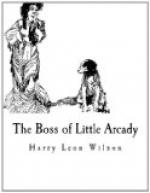“Also as to mint juleps—remember that you have forgotten, if you ever knew how they are made.”
“Dear, dear—and our Bishop did enjoy his mint julep so!”
“That’s different,” I said; “they were probably raised together.”
“And that afternoon, I thought something of the sort was necessary; do you know, they seemed rather cold to me at that other meeting—and of course there wasn’t enough of it to hurt them.”
“Your intentions were amiable, I concede, but your carelessness was criminal—nothing short of it. You laid the train for a scandal that would have shaken Slocum County to its remotest outlying cornfield, and even made itself felt over this whole sovereign state.”
I was gratified to see that she shuddered.
“I shall never learn,” she pleaded; “their life is so different.”
“Let them at least live it out to its natural end, such as it is,” I urged.
Hereupon, confessing herself unnerved, Miss Caroline led me to the dining room, and in a glass of Madeira from a cask forwarded by Second-cousin Colonel Lucius Quintus Peavey, C.S.A., she pledged herself to preserve the decencies as these had been codified in Little Arcady by the Sons and Daughters of Temperance. For my part I drank to her continuance in the wondrous favor of Heaven.
Thereafter, I am bound to say, Miss Caroline conducted herself with a discretion that was admirable. Upon more than one occasion I was made to notice this. One of them was at an evening entertainment at the Eubanks home that autumn, to which it was my privilege to escort her. “A large and brilliant company was present,” to quote from a competent authority, and the refreshments were “recherche,” to quote again, this being, I believe, the first of our social functions at which Japanese paper napkins were handed around. Eustace Eubanks entertained “one and all” by exhibiting and describing lantern views of important scenes in the Holy Land; Marcella sang “Comin’ Thro’ the Rye” with such iron restraint that the most fastidious among us could have found no cause for offence, and Eustace sang an innocent song of war and bloodshed and death. All went well until Eustace, being pressed for more, ventured a drinking song. Whether this had been censored by his household I have never learned. Perhaps there had been demurs—there were almost certain to have been; and possibly Eustace had held out for the thing because of the rare opportunity it afforded for the exercise of his lowest tones. Perhaps it had been deemed wise to indulge him in this, lest in rebellion he break all bonds of propriety and revert to the “Bedouin Love Song.” At any rate he sang “Drinking,” a song that lauds the wine-cup as chiefest of godless joys, and terminating in “drinking” thrice reiterated, of which each individual one finishes so much lower than it begins that the last one seems to expire in the bottomless pit.




